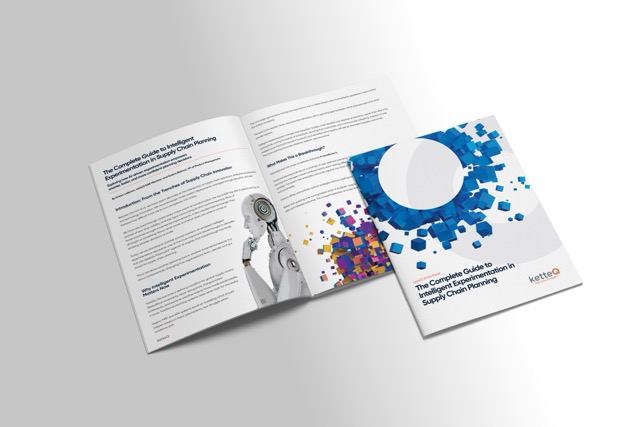
Intelligent Experimentation: The Breakthrough Supply Chain Leaders Can’t Afford to Ignore
Supply chain leaders have seen every wave of so-called transformation.
We have built ERP systems, expanded global sourcing, implemented APS and IBP, and chased the promise of AI and machine learning. Each innovation promised more control and delivered incremental gains. Yet none solved the most complex challenge: how to plan confidently in a world filled with uncertainty.
That is about to change.
For the first time, supply chains can respond to disruption and learn from it. Thanks to AI-enabled Intelligent Experimentation, planners no longer have to rely on fixed assumptions, outdated parameters, or best guesses. They can now test thousands of possibilities, evaluate what works, and make decisions proven to perform under pressure.
This is not a minor improvement. It is a fundamental redefinition of what planning means.
What Is Intelligent Experimentation?
Put simply, Intelligent Experimentation is the ability to run thousands of AI-driven simulations that continuously test, learn, and adapt in real time. It turns uncertainty into opportunity.
Instead of static “what-if” scenarios, it enables a continuous cycle of discovery and optimization. Each simulation explores different combinations of variables such as demand, supply, lead times, constraints, and risk factors. The system then evaluates outcomes and learns which strategies perform best.
In other words, AI is at work, not just for prediction but for improvement. It runs rapid-fire experiments at a scale and speed that humans could never achieve.
Want to see how Intelligent Experimentation transforms decision-making in real-world supply chains? Download the full guide: The Complete Guide to Intelligent Experimentation in Supply Chain Planning.

Why Traditional Planning Has Hit a Wall
Most legacy planning systems are built for stability, not volatility. They are designed to model a single version of the future where supply, demand, and constraints behave predictably.
In today’s environment, that assumption no longer holds. Supply chains face constant disruption from geopolitical shocks, material shortages, labor constraints, and shifting consumer demand. Deterministic systems cannot keep up. They produce plans that look perfect on paper but fail in execution.
That growing gap between a plan and reality forces planners into constant firefighting. They spend more time troubleshooting than improving, while leadership asks, “Why didn’t we see this coming?”
Intelligent Experimentation changes the equation by shifting planning from static prediction to dynamic learning.

How PolymatiQ™ Makes It Possible
ketteQ’s PolymatiQ™ agentic AI engine turns Intelligent Experimentation from concept to capability.
Instead of running one optimal solve, PolymatiQ™ autonomously manages a swarm of experiments. Each explores different supply, demand, and constraints combinations while running multiple passes that evaluate performance against key metrics such as cost, service, margin, working capital, and sustainability.
The outcome is not a single plan but a ranked set of validated strategies, each backed by hard data and explainable logic. The system learns continuously, improving the next iteration every time it runs.
This is planning that never stops learning. It adapts as quickly as the world changes.
From Reactive to Proactive: A Planner’s New Role
Intelligent Experimentation does not replace planners. It amplifies them.
By automating the heavy lifting of scenario testing, PolymatiQ™ frees planners to focus on strategy, risk mitigation, and innovation. They can explore trade-offs with confidence and challenge assumptions using evidence rather than intuition.
A planner’s questions shift from “What happened?” to “What is next, and how do we prepare?”
This transformation elevates planning from reactive firefighting to proactive decision-making. It gives organizations the confidence to move faster and smarter.

The Proof Is in the Results
For PPF, a leading European pet food manufacturer, the impact of Intelligent Experimentation was immediate.
After years of struggling to extract value from its legacy planning system, PPF turned to ketteQ’s PolymatiQ. Within five weeks, the first plant went live, running thousands of experiments that uncovered improvements no static system could find.
The results spoke for themselves:
- Capacity utilization increased by more than 13%.
- Waste dropped by 10.2%, saving 22 tons of cost.
- Agility improved across plants, markets, and customers.
Encouraged by these results, PPF rolled out PolymatiQ™ to 12 factories across 10 countries and 35 markets, standardizing adaptive planning across its global network.
Intelligent Experimentation was built to deliver these kinds of outcomes: fast, measurable, and scalable.
The Future Is Learning
Every significant evolution in supply chain management has had its defining moment: ERP, IBP, cloud computing, and now AI.
Intelligent Experimentation represents the next transformation. It is not just a technology shift; it is a mindset shift. It enables systems and organizations to learn continuously and make confident decisions in the face of uncertainty.
The leaders who embrace it today will define the next era of supply chain performance. Those who wait will spend the next decade catching up.
Download the Full Guide
Learn how ketteQ’s PolymatiQ™ agentic AI engine redefines supply chain planning through Intelligent Experimentation.
Download the complete guide, The Complete Guide to Intelligent Experimentation in Supply Chain Planning, and explore how leading companies are using this breakthrough to turn uncertainty into competitive advantage.






